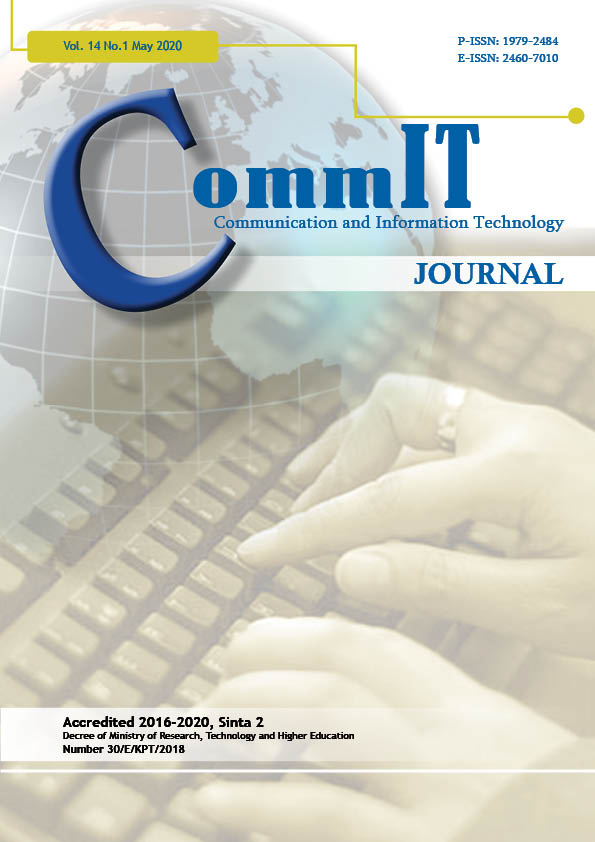Implementation of Structured Object-Oriented Formal Language for Warehouse Management System
DOI:
https://doi.org/10.21512/commit.v14i1.5942Keywords:
Software Engineering, Safety-critical, Structured Object-Oriented Formal Language, Object- Based Programming, Software QualityAbstract
Designing process is inseparable from software development. Like other software development processes, designing process faces many problems, such as improper and ambiguous specifications. These problems may be overcome by applying formal engineering methods. One of which is Structured Object-Oriented Formal Language (SOFL). The analysis and formation of the design and implementation of SOFL are carried out as a solution to the problem. The application of SOFL is divided into three parts according to SOFL rules, namely informal specification, semi-formal specification, and formal specification. The design and implementation are measured and tested using rigorous review and maintainability index. This research uses a warehouse management system, a safety-critical system, as a case study. Rigorous analysis shows that SOFL in warehouse management system increases the maintainability index of 56.94%. It means that it is easier to develop.
References
R. S. Pressman, Software engineering: A practitioner’s approach. New York: McGraw-Hill Education, 2014.
X. Luo, S. Liu, and H. Wu, “A framework for transforming SOFL formal specifications to programs,” in 2015 6th IEEE International Conference on Software Engineering and Service Science (ICSESS). Beijing, China: IEEE, Sept. 23–25, 2015, pp. 15–18.
W. Miao and S. Liu, “Service-oriented modeling using the SOFL formal engineering method,” in 2009 IEEE Asia-Pacific Services Computing Conference (APSCC). Singapore: IEEE, Dec. 7–11, 2009, pp. 187–192.
S. Liu, Formal engineering for industrial software development: Using the SOFL method. New York: Springer Science & Business Media, 2013.
L. E. G. Martins and T. Gorschek, “Requirements engineering for safety-critical systems: Overview and challenges,” IEEE Software, vol. 34, no. 4, pp. 49–57, 2017.
F. Nagoya, S. Liu, and K. Hamada, “Developing a web dictionary system using the SOFL three-step specification approach,” in 2015 5th International Conference on IT Convergence and Security (ICITCS). Kuala Lumpur, Malaysia: IEEE, Aug. 24–27, 2015, pp. 1–5.
H. Rohayani, F. L. Gaol, B. Soewito, and H. L. Hendric, “Estimated measurement quality software on structural model academic system with function point analysis,” in 2017 International Conference on Applied Computer and Communication Technologies (ComCom). Jakarta, Indonesia: IEEE, May 17–18, 2017, pp. 1–5.
M. Li and S. Liu, “Tool support for rigorous formal specification inspection,” in 2014 IEEE 17th International Conference on Computational Science and Engineering. Chengdu, China: IEEE, Dec. 19–21, 2014, pp. 729–734.
I. Heitlager, T. Kuipers, and J. Visser, “A practical model for measuring maintainability,” in 6th International Conference on the Quality of Information and Communications Technology (QUATIC 2007). Lisbon, Portugal: IEEE, Sept. 12–14, 2007, pp. 30–39.
H. K. Brar and P. J. Kaur, “Differentiating integration testing and unit testing,” in 2015 2nd International Conference on Computing for Sustainable Global Development (INDIACom). New Delhi, India: IEEE, Mar. 11–13, 2015, pp. 796–798.
Downloads
Published
How to Cite
Issue
Section
License
Copyright (c) 2020 CommIT (Communication and Information Technology) Journal

This work is licensed under a Creative Commons Attribution-ShareAlike 4.0 International License.
Authors who publish with this journal agree to the following terms:
a. Authors retain copyright and grant the journal right of first publication with the work simultaneously licensed under a Creative Commons Attribution License - Share Alike that allows others to share the work with an acknowledgment of the work's authorship and initial publication in this journal.
b. Authors are able to enter into separate, additional contractual arrangements for the non-exclusive distribution of the journal's published version of the work (e.g., post it to an institutional repository or publish it in a book), with an acknowledgment of its initial publication in this journal.
c. Authors are permitted and encouraged to post their work online (e.g., in institutional repositories or on their website) prior to and during the submission process, as it can lead to productive exchanges, as well as earlier and greater citation of published work.
Â
USER RIGHTS
All articles published Open Access will be immediately and permanently free for everyone to read and download. We are continuously working with our author communities to select the best choice of license options, currently being defined for this journal as follows: Creative Commons Attribution-Share Alike (CC BY-SA)
























